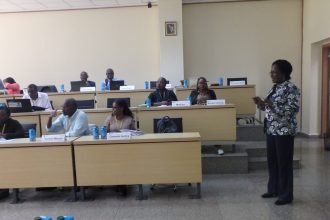By Lenah Bosibori
Kenyan lawmakers and health experts are sounding the alarm over the country’s rising maternal deaths, urging Parliament to fast-track stalled health bills and enforce stronger accountability mechanisms to protect mothers and newborns. They warn that preventable deaths continue to rob families daily—despite decades of policy commitments.
The leaders spoke last week in Nairobi during a high-level policy dialogue that brought together parliamentarians, medical experts, and civil society organisations to accelerate progress on three critical health bills: the Maternal, Newborn and Child Health (MNCH) Bill, the Assisted Reproductive Technologies (ART) Bill, and the Breastfeeding Mothers Bill.
Dr. James Nyikal, Chair of the National Assembly’s Health Committee, said Kenya is running out of time to meet global targets.
“We meet at a critical moment,” he noted. “Parliament—especially women legislators—must reaffirm that the health and survival of mothers and children remain a national priority.”
Despite extensive research in public health, Dr. Nyikal noted, too few findings have translated into actionable innovations that improve outcomes in clinics and communities.
The forum, convened by the Health NGOs’ Network (Hennet), sought to strengthen Kenya’s MNCH legal framework and push for long-overdue reforms that could reverse troubling trends in maternal and child health.
Dr. Nyikal highlighted the progress of the ART Bill, sponsored by Hon. Millie Odhiambo, which has already passed the National Assembly and now awaits Senate approval. He underscored the urgency of regulating surrogacy, egg donation, and fertility services to safeguard donors, children, and families.
On the Breastfeeding Mothers Bill, currently undergoing committee review, Dr. Nyikal emphasized the need for stronger workplace protections and improved infant nutrition. “The bill aims to secure a child’s right to proper nutrition during the first two years—when brain development is at its peak,” he said.
But cultural barriers also persist. “People feel shy about a mother feeding her child, yet eat snacks openly in public transport,” he remarked, calling such stigma “both harmful and ironic.”
Kenya’s maternal mortality rate—estimated between 355 and 530 deaths per 100,000 live births—remains among the highest in Africa. Most of these deaths are caused by preventable complications: haemorrhage, obstructed labour, eclampsia, and sepsis.
“We should not be in this category,” Dr. Nyikal stressed, urging researchers to investigate how devolution and weak primary healthcare systems may be contributing to the deaths. He warned that even with six national referral hospitals, progress will stall unless counties equip and staff lower-level facilities where most Kenyans seek care.
Implementation Gap, Not Policy Gap
Dr. Margaret Lubaale, Executive Director of Hennet, said Kenya’s policy framework is strong—but poorly implemented. “This country has no shortage of policies,” she said. “We know where the gap is—implementation.”
She criticized the mismatch between political commitments and financing. “We produce stellar reports and policies. That’s not our problem. Our problem is putting our money where our mouth is, because sometimes the money does not follow the mouth.”
Her remarks highlighted the chronic underfunding of MNCH services, a challenge that has stalled progress for years.
System Failures Costing Lives
Professor Ann Kihara, President of the International Federation of Gynecology and Obstetrics (FIGO), delivered one of the strongest warnings of the day. “There is nothing more painful than telling a woman that her baby is gone,” she said, attributing many maternal and newborn deaths to “system failures” such as lack of blood pressure machines, foetal monitors, and trained staff.
She expressed concern that inadequate newborn care is creating a generation of children living with preventable disabilities. Rising adolescent pregnancies and new HIV infections among girls aged 10–14, she added, reflect deep systemic gaps.
“Real-time data is essential,” she said. “We cannot reduce maternal mortality without knowing where we stand. Maternal and newborn health statistics remain locked behind bureaucracy.”
Prof. Kihara also urged policymakers to stop prioritizing “white elephant buildings” without equipment and instead invest in essential supplies, accountability, and research that includes women. “Much medical research still relies on male-centered studies,” she noted.
A Call for Political Will
The forum concluded with a united call to accelerate the pending bills, secure dedicated funding for MNCH, strengthen oversight, and ensure that counties are held accountable for maternal and newborn health outcomes.
“The true measure of our work will be seen in healthier mothers, safe births, and children who can thrive,” Dr. Nyikal said.




